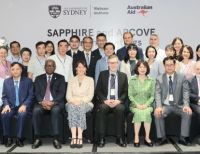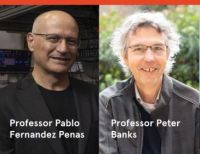
Director of the Net Zero Institute, Professor Deanna D'Alessandro. Image: Stefanie Zingsheim, University of Sydney
Professor Deanna D'Alessandro from the Faculty of Engineering will lead the Net Zero Institute with a focus on decarbonisation solutions in partnership with government, industry, business and communities; technologies and policies that allow for responsible and rapid adoption and impact.
The Institute already has established industry and scientific advisory boards comprising sector-leading experts from Worley, Mitsubishi Heavy Industries, Veolia, Origin, HSBC, Hyundai, Arnott’s, and Rio Tinto. Recently announced, the University of Sydney Business School will also offer an executive Net Zero course in partnership with HSBC Australia to support Australian corporates preparing for upcoming mandatory sustainability reporting.
Professor Emma Johnston, Deputy Vice-Chancellor (Research), said Professor D’Alessandro will lead the new multi-disciplinary Institute while continuing to play a direct role in driving the net zero mission forward.
“Professor D’Alessandro is a world-leading researcher whose team worked with industry partners Southern Green Gas, to develop technology that captures and removes carbon dioxide from the atmosphere. She is focused on the translation of research innovations to commercialisation and impact, bridging the gap between science and the boardroom to accelerate change.”
“Professor D'Alessandro is ideally placed to harness the immense breadth and depth of expertise at the University to support the rapid transition the world needs to make towards net zero emissions.”
Professor D’Alessandro said since the Initiative was first conceived in 2022 as a “grassroots” collective, it has quickly gained momentum.
“We now comprise over 150 researchers and the pace of growth is only quickening with our elevation to Institute. The broadening of the Institute’s scope is integral to developing decarbonised solutions that address climate change drivers across society, spanning the whole decarbonisation puzzle.
“Climate change is a pernicious, whole-of-society issue that requires a whole-of-institution response. It is deeply embedded in every facet of our society, and it is an issue we must tackle on every front.”
“Take, for example, computing. It was initially heralded for reducing paper use. But now we have e-waste, we have data centres that require vast amounts of energy to run.”
















